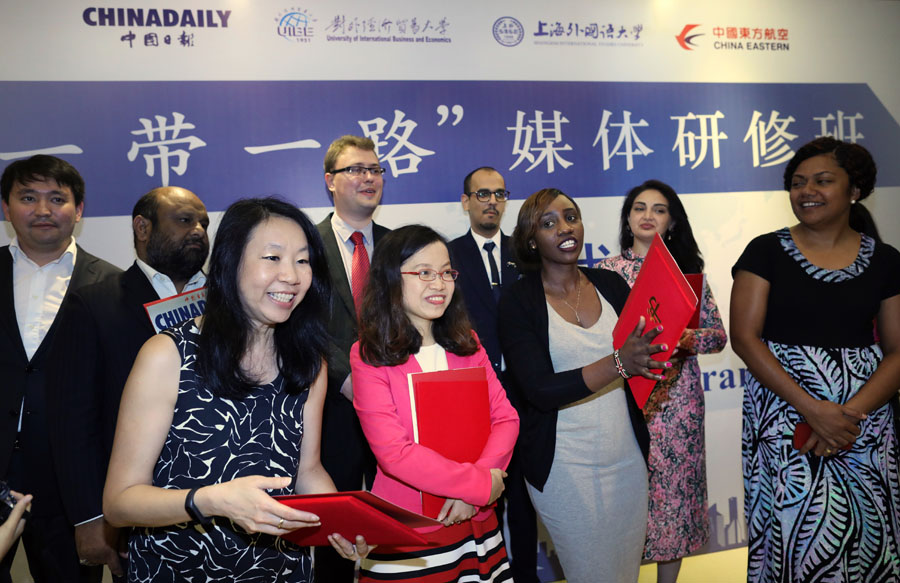Journalists from Belt and Road countries learn about China
Editors and reporters from 12 countries involved in the Belt and Road Initiative receive certificates for a media training program that concluded in Beijing on Wednesday.
Thirteen senior editors and reporters from 12 countries involved in the Belt and Road Initiative have gained a deeper understanding of China's development in the new era after a training program that concluded in Beijing on Wednesday.

Editors and reporters from 12 countries involved in the Belt and Road Initiative receive certificates for a media training program that concluded in Beijing on Wednesday. [Photo/China Daily]
Funded by the Dongfang Fellowship Program, which took the foreign journalists to Shanghai, Hangzhou and Beijing, the classes and cultural exchanges began on June 20. They were taught about the country's profound changes in the economic, political, cultural and ecological areas since its reform and opening-up 40 years ago.
The training program was jointly hosted by China Daily, Shanghai International Studies University and the University of International Business and Economics in Beijing. It was sponsored by China Eastern Airlines.
The goal of the program is to contribute to the journalists' professional development and eventually to promote the common development of China and all other countries and regions.
Jiang Jianguo, deputy head of the Publicity Department of the Communist Party of China Central Committee and minister of the State Council Information Office of China, said the program is an example of the inclusiveness of the Belt and Road Initiative.
This year marks the fifth anniversary of the Belt and Road Initiative, which was proposed by President Xi Jinping in 2013, Jiang said.
He said the foreign journalists could spread the Silk Road spirit to the world through their stories and pictures, with peace and cooperation, openness and inclusiveness, mutual learning and mutual benefit at its core.
"We welcome more reports on the important and practical cooperation among countries and regions involved in the initiative," he said.
Zhou Shuchun, China Daily's publisher and editor-in-chief, said he hoped to make the program a branded one of international media communication since China Daily, as China's global English newspaper, has been committed to facilitating international communication.
He said China Daily will work with other co-hosts to make the program play a bigger role in promoting connectivity of people under the Belt and Road Initiative.
Jiang Qingzhe, Party chief of the University of International Business and Economics, said journalists should acknowledge the diversity of different cultures and promote exchange and dialogue among different civilizations.
The fellowship program is of great significance and it will contribute to more cultural exchanges between the countries and regions involved in the initiative, he said.
Li Yansong, president of Shanghai International Studies University, said the program offers a rare opportunity for the participants to have a firsthand understanding of China and help them find the answers to their queries on the country.
Leonid Kovachich, a participant in the fellowship program and an editor at Russia's Sputnik News Agency, said the program offers him a unique opportunity to see China with his own eyes.
"In the modern world of media, it is very difficult to figure out what is really going on in China, relying only on available third-party sources," he said.
Vu Thu Ha, another participant and an editor at Vietnam's Viet Nam News, said that on her return flight her luggage will be overweight because it will be filled with goods bought in China and wisdom gained after nearly a month in the country.
"We all agreed that what we have gained through this program has gone beyond our expectation," she said. "For us, especially those coming from distant countries, this is really a mind-opening trip, which helps answer the many questions that we had about China before."